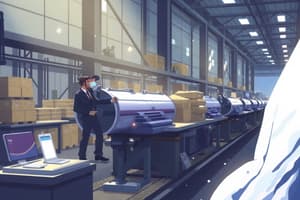Podcast
Questions and Answers
What role do activity cost drivers play in an ERP system?
What role do activity cost drivers play in an ERP system?
- They focus only on historical data for budgeting purposes.
- They are designed to estimate indirect costs accurately.
- They are primarily used for financial reporting.
- They allow for the calculation of direct costs associated with specific processes. (correct)
Which of the following is NOT a benefit of integrating ERP systems with activity-based costing?
Which of the following is NOT a benefit of integrating ERP systems with activity-based costing?
- Improved reliability of financial forecasts.
- Enhanced integration of multiple systems.
- Greater difficulty in managing process controls. (correct)
- Increased availability of cost-driver information.
How does activity-based budgeting assist organizations?
How does activity-based budgeting assist organizations?
- It emphasizes historical expenditure over future planning.
- It simplifies the budgeting process by ignoring nonfinancial measures.
- It avoids the use of direct material estimates.
- It anticipates demand and estimates practical capacity. (correct)
Why do traditional production systems lack integration?
Why do traditional production systems lack integration?
Which aspect of the SAP R/3 system enhances materials handling?
Which aspect of the SAP R/3 system enhances materials handling?
What is one challenge associated with identifying nonfinancial measures?
What is one challenge associated with identifying nonfinancial measures?
Which of the following best describes the function of ERP systems?
Which of the following best describes the function of ERP systems?
Which characteristic distinguishes ERP systems from traditional systems?
Which characteristic distinguishes ERP systems from traditional systems?
What is a primary advantage of collecting nonfinancial measures in ERP systems?
What is a primary advantage of collecting nonfinancial measures in ERP systems?
What does lack of process controls in traditional systems lead to?
What does lack of process controls in traditional systems lead to?
What is the primary objective of a production planning system within ERP?
What is the primary objective of a production planning system within ERP?
Which of the following is a key benefit of Just-in-Time (JIT) systems in production management?
Which of the following is a key benefit of Just-in-Time (JIT) systems in production management?
What critical issue does a lack of integration in traditional production systems create?
What critical issue does a lack of integration in traditional production systems create?
What is the role of the Master Production Schedule (MPS) in materials resource planning?
What is the role of the Master Production Schedule (MPS) in materials resource planning?
Which of the following best describes Capacity Planning within ERP systems?
Which of the following best describes Capacity Planning within ERP systems?
What problem does Materials Requirement Planning (MRP) primarily address?
What problem does Materials Requirement Planning (MRP) primarily address?
What disadvantage is often associated with traditional manufacturing systems?
What disadvantage is often associated with traditional manufacturing systems?
How does the integration of ERP systems contribute to operational efficiency in production?
How does the integration of ERP systems contribute to operational efficiency in production?
Which of the following processes is part of operational-level activities in production?
Which of the following processes is part of operational-level activities in production?
What distinguishes Advanced Planning and Scheduling (APS) systems in manufacturing?
What distinguishes Advanced Planning and Scheduling (APS) systems in manufacturing?
Activity-based costing systems only derive information from financial measures.
Activity-based costing systems only derive information from financial measures.
ERP systems are designed to improve both production planning and materials management.
ERP systems are designed to improve both production planning and materials management.
The SAP R/3 system does not allow for the establishment of standards in materials handling.
The SAP R/3 system does not allow for the establishment of standards in materials handling.
Direct costs can be calculated in an ERP system instead of being classified as overhead.
Direct costs can be calculated in an ERP system instead of being classified as overhead.
Activity-based budgeting involves estimating demand based solely on historical data.
Activity-based budgeting involves estimating demand based solely on historical data.
Traditional production systems provide high levels of integration within organizations.
Traditional production systems provide high levels of integration within organizations.
Activity cost drivers are essential for effective activity-based costing in ERP systems.
Activity cost drivers are essential for effective activity-based costing in ERP systems.
Nonfinancial measures collected in ERP systems do not undergo any formal processes.
Nonfinancial measures collected in ERP systems do not undergo any formal processes.
Materials Requirement Planning (MRP) addresses issues of product delivery timing.
Materials Requirement Planning (MRP) addresses issues of product delivery timing.
Just-in-Time (JIT) systems are primarily designed to increase inventory levels.
Just-in-Time (JIT) systems are primarily designed to increase inventory levels.
Just-in-Time (JIT) systems aim to maintain excess inventory levels for production.
Just-in-Time (JIT) systems aim to maintain excess inventory levels for production.
Material Resource Planning (MRP) uses inputs from the Master Production Schedule (MPS) to create a detailed material plan.
Material Resource Planning (MRP) uses inputs from the Master Production Schedule (MPS) to create a detailed material plan.
Excess inventories have no impact on cash flow and profitability in an organization.
Excess inventories have no impact on cash flow and profitability in an organization.
Manufacturing Execution Systems (MES) provide real-time feedback on factory floor operations.
Manufacturing Execution Systems (MES) provide real-time feedback on factory floor operations.
A lack of integration between sales and production does not affect inventory levels.
A lack of integration between sales and production does not affect inventory levels.
Capacity Planning only requires estimation of human resources and does not involve specific information.
Capacity Planning only requires estimation of human resources and does not involve specific information.
Data collection systems are essential for supporting manufacturing processes in an ERP environment.
Data collection systems are essential for supporting manufacturing processes in an ERP environment.
Inadequate information from other divisions can lead to issues in manufacturing processes.
Inadequate information from other divisions can lead to issues in manufacturing processes.
Sales forecasts are not necessary for the development of production plans in ERP systems.
Sales forecasts are not necessary for the development of production plans in ERP systems.
Automated data collection enhances the accuracy and efficiency of information in manufacturing systems.
Automated data collection enhances the accuracy and efficiency of information in manufacturing systems.
Flashcards
ERP systems & Activity-based costing
ERP systems & Activity-based costing
ERP systems improve activity-based costing by increasing the availability and reliability of activity cost driver information, integrating multiple systems, and allowing for better process controls.
Activity-based costing (ABC)
Activity-based costing (ABC)
A costing method that identifies activities in an organization and allocates costs based on consumption of resources by those activities.
Activity Cost Driver
Activity Cost Driver
A factor that drives the cost of an activity.
ERP Systems & Materials Management
ERP Systems & Materials Management
Signup and view all the flashcards
Activity-based budgeting
Activity-based budgeting
Signup and view all the flashcards
Traditional Production Systems
Traditional Production Systems
Signup and view all the flashcards
ERP Systems & Supply Chain
ERP Systems & Supply Chain
Signup and view all the flashcards
ERP Production Management
ERP Production Management
Signup and view all the flashcards
Materials Management
Materials Management
Signup and view all the flashcards
Production Planning
Production Planning
Signup and view all the flashcards
MRP (Material Requirements Planning)
MRP (Material Requirements Planning)
Signup and view all the flashcards
Just-in-Time (JIT) Systems
Just-in-Time (JIT) Systems
Signup and view all the flashcards
Capacity Planning
Capacity Planning
Signup and view all the flashcards
Manufacturing Execution Systems (MES)
Manufacturing Execution Systems (MES)
Signup and view all the flashcards
Supply Chain Integration
Supply Chain Integration
Signup and view all the flashcards
ERP System Benefits
ERP System Benefits
Signup and view all the flashcards
Traditional Production Systems Problems
Traditional Production Systems Problems
Signup and view all the flashcards
Production Management in ERP
Production Management in ERP
Signup and view all the flashcards
Materials Management
Materials Management
Signup and view all the flashcards
Traditional Production Problems
Traditional Production Problems
Signup and view all the flashcards
Production Planning
Production Planning
Signup and view all the flashcards
Material Requirements Planning (MRP)
Material Requirements Planning (MRP)
Signup and view all the flashcards
Just-in-Time (JIT) Systems
Just-in-Time (JIT) Systems
Signup and view all the flashcards
Capacity Planning
Capacity Planning
Signup and view all the flashcards
Manufacturing Execution Systems (MES)
Manufacturing Execution Systems (MES)
Signup and view all the flashcards
ERP System Benefits
ERP System Benefits
Signup and view all the flashcards
Supply Chain Integration
Supply Chain Integration
Signup and view all the flashcards
ERP & Cost Control
ERP & Cost Control
Signup and view all the flashcards
ERP & Productivity
ERP & Productivity
Signup and view all the flashcards
ERP & Decision Making
ERP & Decision Making
Signup and view all the flashcards
ABC & ERP
ABC & ERP
Signup and view all the flashcards
Activity-based Costing
Activity-based Costing
Signup and view all the flashcards
ERP & Activity Cost Driver
ERP & Activity Cost Driver
Signup and view all the flashcards
Activity-based Budgeting
Activity-based Budgeting
Signup and view all the flashcards
Traditional Production Systems
Traditional Production Systems
Signup and view all the flashcards
ERP & Supply Chain
ERP & Supply Chain
Signup and view all the flashcards
Study Notes
ERP Systems: Production and Materials Management
-
ERP systems aim to integrate production and materials management.
-
Chapter objectives include examining production management and materials management systems within ERP. Key interrelationships among supporting business processes are also noted.
Case Study: Atlantic Manufacturing
-
Materials and manufacturing experienced inconsistent raw material and finished product levels.
-
Timely change specifications were often missing.
-
Sequential design contributed to longer lead times.
-
Information flow between divisions was inadequate.
-
Purchasing requisitions were lost.
Manufacturing Systems Background
-
Earlier systems focused on re-ordering inventory using a reorder point.
-
Systems adapted to customer orders for increased flexibility and responsiveness.
-
The 60s, 70s, and 80s saw high-volume production of a limited number of products.
-
Mainframe-based databases later facilitated production of new products to suit customer needs.
-
Flexible and changeable systems emerged, followed by manufacturing execution systems for feedback and control.
-
The 1990s saw integration of processes and data, leading to operational efficiency, and total integration.
Problems with Traditional Production Systems
-
Lack of integration between organizational divisions.
-
Production not adequately linked to sales.
-
Inaccurate forecasts led to incorrect purchasing decisions.
-
Imbalances in raw material and finished goods often resulted.
-
Excess or insufficient inventory levels were common.
-
These issues negatively impacted cash flow and profitability.
Production Systems Objectives
-
Establish a production plan.
-
Acquire necessary raw materials.
-
Schedule equipment, facilities, and human resources.
-
Design products.
-
Produce products in appropriate quantities and with expected quality.
Production Planning and Manufacturing Processes
-
Operational-level processes like daily activities, purchasing, receiving, inspection, quality control, and inventory management are key components.
-
Effective handling of raw materials, products, and receivables is crucial.
Information Systems Support
- ERP relies on information systems like data collection systems, material management systems, Bill of Materials (BOM) systems, inventory management systems, and cost accounting systems.
Material Resource Planning (MRP) Processes
-
MRP identifies needed stock, calculates lead times, and determines safety stock levels.
-
It assigns optimal order quantities.
-
MRP creates accurate purchase orders using inputs from the Master Production Schedule (MPS).
-
MPS relies on sales forecasts to determine needed products.
MRP Vocabulary
-
MRP: The amount and timing of raw material orders needed to support the Master Production Schedule (MPS).
-
BOM: The materials needed to make a product ("recipe").
-
Lead times: Time for supplier to process and ship materials.
-
Lot sizing: Production quantities.
-
MPS: Master Production Schedule.
-
Gross requirements: Raw materials needed for production.
-
Planned orders: Required raw materials.
Just-in-Time Systems
-
Ideal manufacturing models prioritize maintaining only necessary inventory levels.
-
Materials are delivered only as needed to meet production schedules.
-
Continuous replenishment of raw materials is critical.
-
Reduced storage space and costs are realized.
-
Supply chain and value chain management effectiveness improves.
Capacity Planning
-
Evaluating production capacity against goals.
-
Defining specific production goals demands specific information.
-
Time-phased plans for products based on specific production areas.
-
Production scheduling allocation of resources.
-
Human resource needs are estimated.
-
Product design and development should integrate cost information.
-
Decision-making concerning cost reduction is improved.
Production Planning and Materials Management Modules
-
ERP systems improve information distribution for materials requirement planning, inventory management, and capacity planning.
-
Database merging eliminates paperwork and bottlenecks.
-
Efficiency increases via reduced costs, shorter lead times, and fewer personnel.
-
Sales forecasts are used to plan production.
-
The Master Production Schedule (MPS) aids in determining product and finished goods quantities and dates.
-
Material requirements planning (MRP) ensures materials are ordered at the right times.
-
Work orders are issued to production as a result.
Materials Management Modules
-
Manufacturing Execution Systems (MES) provide factory floor information and real-time communication.
-
Advanced Planning and Scheduling (APS) systems support business analysis and decision support.
-
Data collection includes real-time capture using mobile or internet-enabled devices.
eBusiness Strategies
-
Facilitates supply chain communication to enable B2B relations.
-
Planning forecasts are improved via market places, enabling aggregation of buyer purchasing power, and reduced costs.
-
Supply chains and e-business problems are addressed.
Featured Article: What ERP Can Offer ABC
- Focuses on the use of manufacturing data within managerial accounting modules, maximizing productivity, streamlining operations, and supporting managerial decisions.
Featured Article: What ERP Can Offer ABC—Continued
-
Activity-based costing systems improve accuracy for cost drivers.
-
ERP systems are valuable for cost driver information, availability, reliability, and integration with multiple systems. Includes systems such as SAP R/3.
Featured Article: What ERP Can Offer ABC—Continued
-
SAP R/3 linking production planning with management.
-
Establishment of standards for materials handling and activity cost driver (number of pallet moves).
-
Materials handling processes attributed to specific products allow direct costs to be calculated.
-
Bills of services are created.
Featured Article: What ERP Can Offer ABC—Continued
-
Activity-based budgeting anticipates demand.
-
Estimates are performed for practical capacity, direct materials, direct costs, and process adjustments.
-
Formal process, reliability, and high integrity result in nonfinancial measures use as drivers.
Summary
-
Traditional production systems lack integration.
-
Organizations experience coordination problems in production, materials, and management.
-
Need for material resource planning (MRP), Just-in-Time (JIT) systems, and capacity planning motivates use of ERP systems.
-
ERP benefits include facilitating supply chain communications and improving e-business capabilities.
Studying That Suits You
Use AI to generate personalized quizzes and flashcards to suit your learning preferences.




